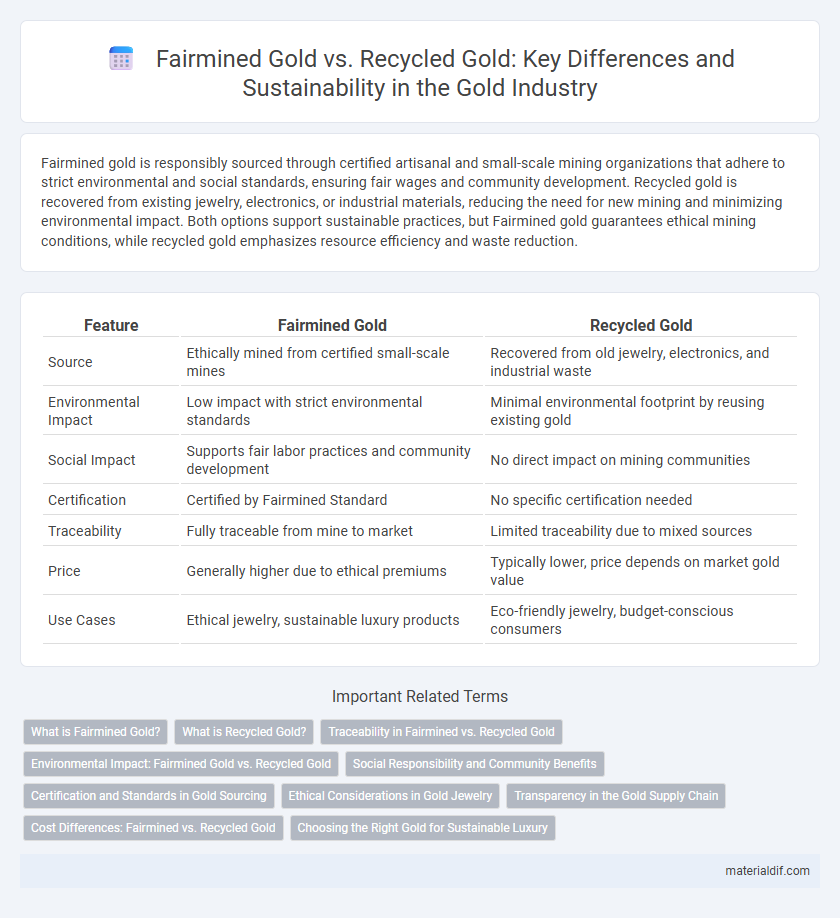Fairmined gold is responsibly sourced through certified artisanal and small-scale mining organizations that adhere to strict environmental and social standards, ensuring fair wages and community development. Recycled gold is recovered from existing jewelry, electronics, or industrial materials, reducing the need for new mining and minimizing environmental impact. Both options support sustainable practices, but Fairmined gold guarantees ethical mining conditions, while recycled gold emphasizes resource efficiency and waste reduction.
Table of Comparison
| Feature | Fairmined Gold | Recycled Gold |
|---|---|---|
| Source | Ethically mined from certified small-scale mines | Recovered from old jewelry, electronics, and industrial waste |
| Environmental Impact | Low impact with strict environmental standards | Minimal environmental footprint by reusing existing gold |
| Social Impact | Supports fair labor practices and community development | No direct impact on mining communities |
| Certification | Certified by Fairmined Standard | No specific certification needed |
| Traceability | Fully traceable from mine to market | Limited traceability due to mixed sources |
| Price | Generally higher due to ethical premiums | Typically lower, price depends on market gold value |
| Use Cases | Ethical jewelry, sustainable luxury products | Eco-friendly jewelry, budget-conscious consumers |
What is Fairmined Gold?
Fairmined gold is responsibly sourced gold certified by the Alliance for Responsible Mining, ensuring miners receive fair wages and operate under strict environmental and social standards. This certification promotes sustainable small-scale mining communities by supporting ethical labor practices and minimizing environmental impact. Unlike recycled gold, which is reclaimed from existing products, Fairmined gold is newly extracted under controlled, socially responsible conditions.
What is Recycled Gold?
Recycled gold is gold that has been previously used in jewelry, electronics, or industrial applications and is melted down to be refined and reused, reducing the need for new mining. This process minimizes environmental impact and energy consumption compared to traditional extraction methods. Unlike Fairmined gold, which is sourced from certified responsible artisanal mining organizations, recycled gold promotes sustainability by repurposing existing materials.
Traceability in Fairmined vs. Recycled Gold
Fairmined gold offers verified traceability through strict certification processes that track its origin from responsible artisanal mining communities. Recycled gold, while environmentally beneficial, often lacks detailed supply chain transparency due to mixed sourcing from various scrap materials. This makes Fairmined gold a preferred choice for consumers prioritizing ethical sourcing and accountable supply chains.
Environmental Impact: Fairmined Gold vs. Recycled Gold
Fairmined gold is extracted through responsible mining practices that prioritize environmental restoration, biodiversity preservation, and reduced chemical use, while recycled gold significantly lowers environmental impact by reusing existing materials and avoiding the disturbances associated with mining. Fairmined gold supports ecosystems and local communities through strict certification standards, whereas recycled gold minimizes water and energy consumption by circumventing the resource-intensive extraction process. Both contribute to sustainability, but recycled gold offers a more immediate reduction in carbon footprint and waste, making it a highly eco-friendly choice.
Social Responsibility and Community Benefits
Fairmined gold guarantees traceable, responsibly sourced gold that directly supports artisanal miners, providing fair wages, safe working conditions, and investments in local community development projects such as education and healthcare. Recycled gold reduces environmental impact by minimizing the demand for newly mined gold, though it may lack the structured social programs and economic empowerment guaranteed by Fairmined certification. Choosing Fairmined gold ensures a transparent supply chain that prioritizes social responsibility and tangible community benefits, while recycled gold primarily contributes to resource sustainability.
Certification and Standards in Gold Sourcing
Fairmined gold is certified by the Alliance for Responsible Mining, ensuring compliance with rigorous social, environmental, and economic standards that benefit artisanal and small-scale miners. Recycled gold adheres to established sustainability and ethical sourcing certifications such as the Responsible Jewellery Council (RJC) and the London Bullion Market Association (LBMA) Responsible Sourcing Program, focusing on reducing environmental impact and promoting traceability. Both certifications emphasize transparency and accountability in gold sourcing but target different stages of the gold supply chain for sustainable practices.
Ethical Considerations in Gold Jewelry
Fairmined gold guarantees ethical sourcing by supporting small-scale mining communities with fair wages, safe working conditions, and environmental stewardship, making it a socially responsible choice in gold jewelry. Recycled gold reduces environmental impact by reusing existing materials, conserving natural resources, and minimizing the carbon footprint associated with mining. Both Fairmined and recycled gold offer ethical advantages, but Fairmined emphasizes social equity and community empowerment, while recycled gold prioritizes sustainability through reduced resource extraction.
Transparency in the Gold Supply Chain
Fairmined gold ensures transparency through rigorous certification that tracks ethical mining practices from extraction to market, fostering trust in responsible sourcing. Recycled gold provides transparency by utilizing existing materials, reducing environmental impact and tracing the metal's origin through established recycling processes. Both methods enhance supply chain visibility, but Fairmined gold offers a direct connection to artisanal miners committed to social and environmental standards.
Cost Differences: Fairmined vs. Recycled Gold
Fairmined gold typically commands a higher market price compared to recycled gold due to its certification guaranteeing ethical mining practices and better social and environmental impact. Recycled gold, sourced from existing jewelry or industrial materials, often incurs lower extraction costs, resulting in a more affordable price point. Buyers seeking responsible sourcing tend to pay a premium for Fairmined gold, reflecting the investment in sustainable mining and community development.
Choosing the Right Gold for Sustainable Luxury
Fairmined gold is certified for ethical sourcing from artisanal and small-scale mining organizations that meet strict social and environmental standards, ensuring fair wages and ecological preservation. Recycled gold minimizes environmental impact by reusing existing materials without the need for new mining, significantly reducing carbon emissions and habitat destruction. Selecting between Fairmined and Recycled gold depends on whether consumers prioritize supporting responsible mining communities or maximizing resource efficiency in sustainable luxury.
Fairmined gold vs Recycled gold Infographic

 materialdif.com
materialdif.com